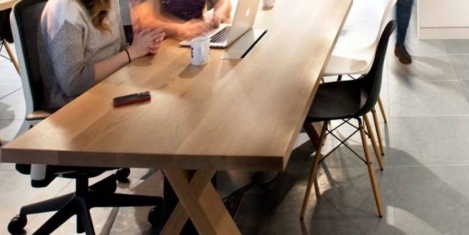January 25, 2017
Just one in five UK workers still take the traditional lunch hour 0
 Only one in five workers in the UK still take the traditional lunch hour break; a stark contrast to France, which sees the lunch hour as a key part of the working day, a new survey by commercial property agency Savoystewart.co.uk claims. Digital marketers take the shortest breaks, taking a meagre average of 14-minutes, followed by recruiters and those in telesales. At the opposite end of the spectrum are media & communication professionals, who take almost their whole hour at 55 minutes. Some of the reasons cited for the shorter break were to please the boss, too much work to do, other colleagues don’t take lunch, there’s nowhere to go or one hour is too long. Half of those polled work right through their lunch break, 30 percent will take under 30 minutes off, 52 percent admit to eating over their desk most days and 27 percent deliberately take a shorter break to please their boss. Yet UK legislation actually allows for a 1 hour interrupted 20-minute rest break after working 6 hours+, and those who are under 18 are entitled to 30 minutes if working above 4.5 hours. Some work contracts may even allow for additional breaks alongside lunch, like tea breaks.
Only one in five workers in the UK still take the traditional lunch hour break; a stark contrast to France, which sees the lunch hour as a key part of the working day, a new survey by commercial property agency Savoystewart.co.uk claims. Digital marketers take the shortest breaks, taking a meagre average of 14-minutes, followed by recruiters and those in telesales. At the opposite end of the spectrum are media & communication professionals, who take almost their whole hour at 55 minutes. Some of the reasons cited for the shorter break were to please the boss, too much work to do, other colleagues don’t take lunch, there’s nowhere to go or one hour is too long. Half of those polled work right through their lunch break, 30 percent will take under 30 minutes off, 52 percent admit to eating over their desk most days and 27 percent deliberately take a shorter break to please their boss. Yet UK legislation actually allows for a 1 hour interrupted 20-minute rest break after working 6 hours+, and those who are under 18 are entitled to 30 minutes if working above 4.5 hours. Some work contracts may even allow for additional breaks alongside lunch, like tea breaks.







 Amos Tversky and Daniel Kahneman introduced the concept of Loss Aversion in 1984, highlighting people’s tendency to strongly prefer avoiding losses to acquiring gains. Most studies suggest that losses are twice as powerful, psychologically, as gains. Lose £100 and we will feel a remorse that easily outweighs winning £100. In a similar fashion we find it very hard to see future positives when confronted with short term loses. We understand easily what we have lost but cannot imagine what there is to be gained. Furthermore, as Frederic Bastiat wrote in an 1850 paper, “That Which is Seen, and That Which is Not Seen”, man has a tendency to “pursue a small present good, which will be followed by a great evil to come, rather than a great good to come, at the risk of a small present evil”. Put these together and it is no wonder that, by and large, the future of work, corporate real estate and the workplace is so widely misunderstood.
Amos Tversky and Daniel Kahneman introduced the concept of Loss Aversion in 1984, highlighting people’s tendency to strongly prefer avoiding losses to acquiring gains. Most studies suggest that losses are twice as powerful, psychologically, as gains. Lose £100 and we will feel a remorse that easily outweighs winning £100. In a similar fashion we find it very hard to see future positives when confronted with short term loses. We understand easily what we have lost but cannot imagine what there is to be gained. Furthermore, as Frederic Bastiat wrote in an 1850 paper, “That Which is Seen, and That Which is Not Seen”, man has a tendency to “pursue a small present good, which will be followed by a great evil to come, rather than a great good to come, at the risk of a small present evil”. Put these together and it is no wonder that, by and large, the future of work, corporate real estate and the workplace is so widely misunderstood.


























January 20, 2017
The facts about sit stand work are already lost in the stream of narrative 0
by Mark Eltringham • Comment, Knowledge, Wellbeing, Workplace design
(more…)